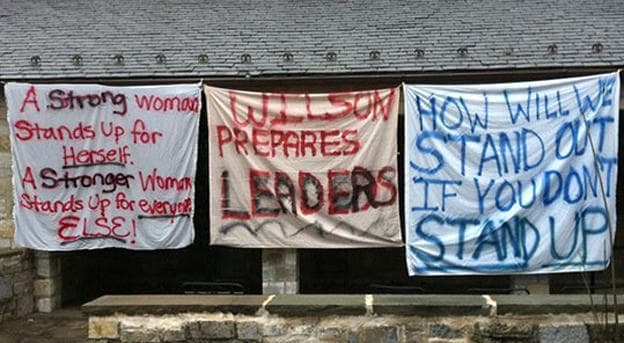Advertisement
What's Happening To Women's Colleges?
Resume
There are fewer than 50 women’s colleges left in the United States, and the number will drop again this fall.
Wilson College in Chambersburg, Penn., recently made the decision to go co-ed.
Faced with declining enrollment and huge deficits, the college's board of trustees and its president decided that admitting men to the undergraduate program would increase the number of students and improve the college's finances.
"Women tend to outperform men, academically, but there are all kinds of societal pressures against it."
David Strauss
Alumnae and current students were up in arms during the decision-making process, and continue to try to overturn the decision through a petition on change.org.
So what is happening to women’s colleges?
Why are Wellesley and Barnard doing well, and others not so much? What would make a young woman forgo the social draw of a co-ed college? And is there a future for single-gender institutions, or have the advances in women’s rights made women’s colleges a thing of the past?
The president of Wilson College, Barbara Mistick, who led the decision-making process and will lead the transition, says Wilson will better serve women by going co-ed.
“Young women today are finding a more open landscape, so they are looking to replicate that when they are looking at colleges," Mistick told Here & Now's Robin Young. "So if we want to continue to respond to the women’s market and to continue to really help women find themselves in an institution, perhaps being co-educational will help us do that.”
According to education consultant David Strauss, women’s colleges that do not have large endowments and don’t draw students who can pay full tuition have a more difficult time being competitive - not only with other women’s schools, but in the higher education landscape.
However, women’s colleges fill a critical function for young women, he said, and remain an important choice for students.
“Women tend to outperform men, academically, but there are all kinds of societal pressures against it. These institutions represent a solution to that, but it’s very difficult for an 18 year old to see it," Strauss told Here & Now. "When young women matriculate at and go through an experience at a women’s college, most of them become converts.”
From The Chronicle of Higher Education:
What's your take on women's colleges? Are they still relevant? Tell us on Facebook.
Guests:
- Barbara Mistick, president of Wilson College.
- David Strauss, consultant with Arts and Science Group.
This segment aired on April 11, 2013.